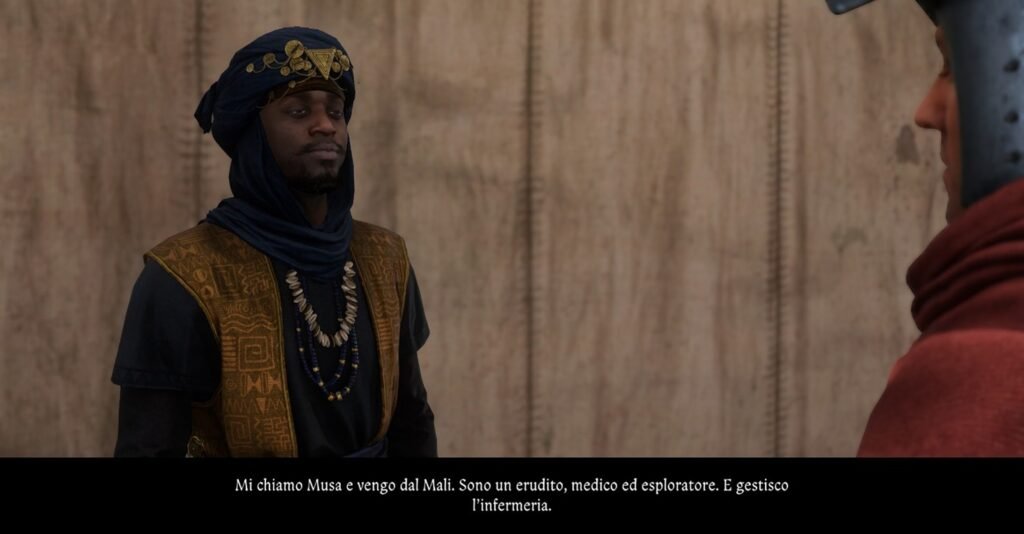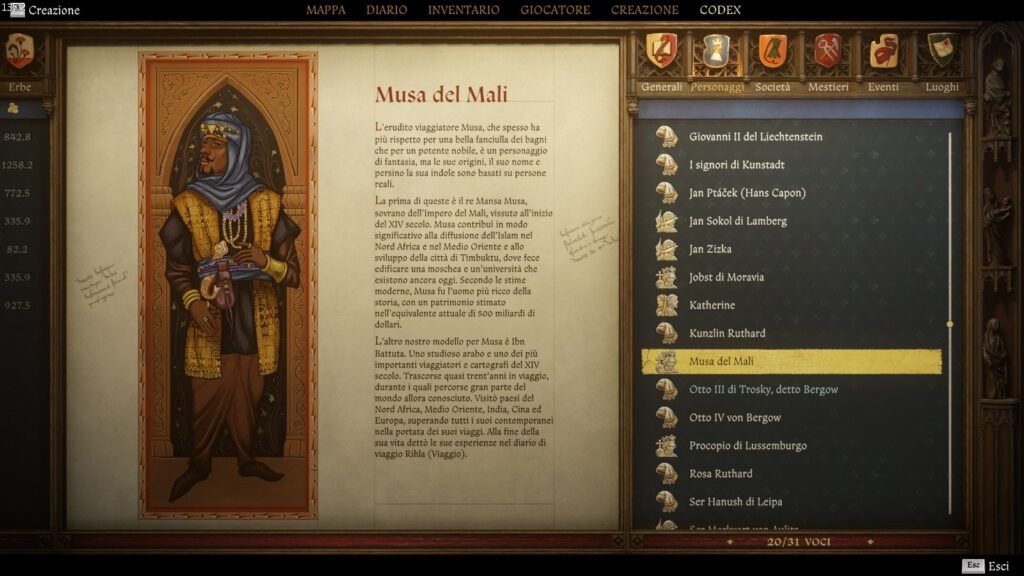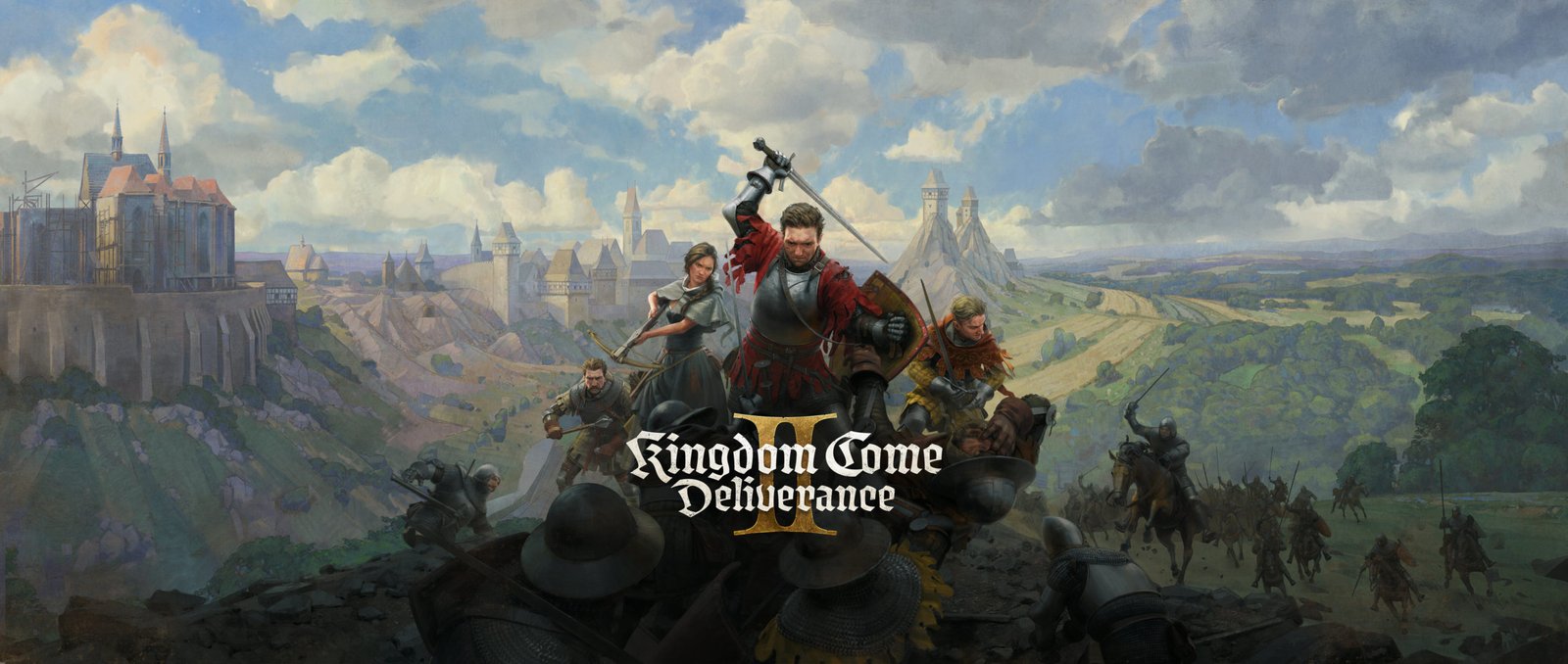By Simone Vitolo (University of Modena)
(English Translation at foot of page)
Il primo Kingdom Come: Deliverance, fu oggetto di critiche a causa della totale assenza di persone nere . In merito a questo argomento una delle risposte da parte del team arrivò da una intervista dal principale storico impiegato nello sviluppo del gioco, Petr Čornej: «As historians, we obviously encounter this confrontation with 21th century postmodernism, which would like to transfer its principles and visions into the Middle Ages or the 19th century […]. Irrespective of the fact that if there were any Moors, as black people were called at the time, then you could say there were unique curiosities that a ruler might have one or two of in his court to liven it up. »
L’impazienza del pubblico e la sete di notizie hanno reso i “rumors” pre-lancio un elemento cruciale, capaci di influenzare significativamente l’opinione generale. Indiscrezioni negative possono scatenare reazioni intense e condizionare il successo di un titolo ancora prima della sua uscita, come dimostra il caso di Concord. Difatti, a diversi mesi dall’uscita di Kingdom Come: Deliverance II, rimbalzò la notizia su tutti i portali d’informazione videoludica che nel titolo sarebbero state presenti persone nere . A questa notizia è corrisposto un forte backlash da parte di quell’utenza che urla al “woke game!” sempre più spesso e sempre più in modo insensato .

Per fortuna alla fine Kingdom Come: Deliverance II si è rivelato come uno dei titoli più acclamati di sempre e dopo qualche settimana dalla sua uscita i giocatori hanno iniziato ad incontrare l’unica persona di colore presente nel titolo, Musa del Mali. Questo personaggio, come sostenuto anche dagli sviluppatori nella voce del codex interno, è un miscuglio fra due personalità storiche come l’esploratore Ibn Battuta e l’imperatore del Mali, Mansa Musa.

Il team Warhorse Studios ha utilizzato il personaggio di Musa per rappresentare in modo decisamente interessante un possibile incontro difficile, ma non impossibile, fra culture molto diverse. Musa permette al giocatore di fare molteplici domande sui suoi viaggi, sulla sua cultura e sulle sue usanze. In questo scambio non manca un siparietto comico inziale dato dall’impatto che ha Henry, il protagonista, nel vedere per la prima volta una persona di colore e di Musa che si trova di fronte all’ennesima reazione curiosa e sospettosa.
Anche in questo caso abbiamo assistito ad una reazione eccessiva da parte di una frangia di utenza che si sta sempre più estremizzando, con forti connotazioni razziste e sessiste. A manforte di questa utenza si possono spesso annoverare le testate giornalistiche sempre alla ricerca di click e visualizzazioni cavalcando, senza pensare alle conseguenze, il fenomeno dei rumors.
Indice delle figure
Figura 2. Codex, scheda personaggio di Musa del Mali Kingdom Come: Deliverance II, PC Windows 11., 2
Sitografia
https://www.vice.com/en_us/article/9kzqxd/kingdom-come-deliverance-waypoint-radio (ultima consultazione 13 aprile 2025).
https://www.ign.com/articles/warhorse-studios-kingdom-come-deliverance-ii-interview (ultima consultazione 13 aprile 2025).
https://www.reddit.com/r/KotakuInAction/comments/1c7cyq9/ign_already_interrogating_warhorse_about/ (ultima consultazione 13 aprile 2025).
https://x.com/ethangach/status/1781032404926288346 (ultima consultazione 15 aprile).
https://steamcommunity.com/app/1771300/discussions/0/601892961775548123/ (ultima consultazione 15 aprile).
https://www.pcgamesn.com/kingdom-come-deliverance-2/preorder-backlash (ultima consultazione 15 aprile).
https://www.thegamer.com/kingdom-come-deliverance-2-discuss-woke-diversity-complaints-culture-war/ (ultima consultazione 15 aprile).
English Translation:
The Era of Rumors and Racism – Kingdom Come: Deliverance II
The first Kingdom Come: Deliverance was the subject of criticism due to the total absence of Black people. Regarding this topic, one of the responses from the team came from an interview with the main historian involved in the game’s development, Petr Čornej: «As historians, we obviously encounter this confrontation with 21st century postmodernism, which would like to transfer its principles and visions into the Middle Ages or the 19th century […]. Irrespective of the fact that if there were any Moors, as black people were called at the time, then you could say there were unique curiosities that a ruler might have one or two of in his court to liven it up. »
The impatience of the public and the desire for news have now made rumors one of the most important aspects before a title’s release, becoming true catalysts of public opinion. A piece of information perceived as negative often leads to very strong reactions from the public, which can determine the fate of a title even before its release, as exemplified by the case of Concord. Indeed, several months before the release of Kingdom Come: Deliverance II, the news circulated on all video game information portals that the title would feature person of color . This news was met with a strong backlash from that segment of the user base that increasingly and nonsensically shouts “woke game!” .

Fortunately, Kingdom Come: Deliverance II ultimately proved to be one of the most acclaimed titles ever, and a few weeks after its release, players began to encounter the only person of color present in the game, Musa of Mali. This character, as also stated by the developers in the internal codex entry, is a blend of two historical figures: the explorer Ibn Battuta and the Emperor of Mali, Mansa Musa.

The Warhorse Studios team used the character of Musa to represent a potentially challenging, but not impossible, encounter between very different cultures in a decidedly interesting way. Musa allows the player to ask numerous questions about his travels, his culture, and his customs. This exchange includes an initial comical scene stemming from the impact Henry, the protagonist, experiences upon seeing a person of color for the first time, and Musa’s reaction to yet another curious and suspicious response.
In this case as well, we witnessed an excessive reaction from a fringe of the user base that is becoming increasingly extremist, with strong racist and sexist undertones. Supporting this user base are often journalistic outlets constantly seeking clicks and views by riding the wave of rumors without considering the consequences.
Figure Index
Figure 1. Presentation of Musa from Mali, Kingdom Come: Deliverance II, PC Windows 11. “My name is Musa, and I come from Mali. I am a scholar, physician, and explorer. And I run the infirmary”, p. 1.
Figure 2. Codex, Musa of Mali character profile, Kingdom Come: Deliverance II, PC Windows 11, p. 2.
Bibliography
https://www.vice.com/en_us/article/9kzqxd/kingdom-come-deliverance-waypoint-radio (last accessed April 13, 2025).
https://www.ign.com/articles/warhorse-studios-kingdom-come-deliverance-ii-interview (last accessed April 13, 2025).
https://www.reddit.com/r/KotakuInAction/comments/1c7cyq9/ign_already_interrogating_warhorse_about/ (last accessed April 13, 2025).
https://x.com/ethangach/status/1781032404926288346 (last accessed April 15).
https://steamcommunity.com/app/1771300/discussions/0/601892961775548123/ (last accessed April 15).
https://www.pcgamesn.com/kingdom-come-deliverance-2/preorder-backlash (last accessed April 15).
https://www.thegamer.com/kingdom-come-deliverance-2-discuss-woke-diversity-complaints-culture-war/ (last accessed April 15).

Thank you for your paper Simone. Similar to the paper we had earlier by Robert Rouse and gender in Age of Empires IV, here we see a tension between historical accuracy and preconceived and politically-driven images of the medieval world. As historians, we know that there were more than just white-people in Europe (although this varied depending on the region), and yet developers still face much backlash from fans who claim to be concerned with historical accuracy. Can you expand on how KCD II approached race in comparison to the first title? How is this character incorporated within the larger game? Does the character lead to some sort of reflection about racial relations in the Middle Ages?
Thank you Juan!
Certainly! In the first chapter, the developers focused primarily on the representation of the Cumans, a steppe people who served as mercenaries under Sigismund. The game shows how they were perceived by the Bohemians as ruthless, demonic raiders, while Henry, the game’s protagonist, will have several opportunities to interact with Cumans and learn about their customs and traditions. Through these encounters, he comes to understand that they are ordinary human beings, with strengths and flaws, just like him.
(A perfect example: in one mission, we must disguise ourselves as a Cuman, following the advice of some survivors who escaped the sacking of their village. Their suggestions include animal horns and other demonic features. In the end, we find out that these survivors had never actually seen the Cumans themselves.)
In KCD II, Henry comes into contact with several different cultures. In some missions, he even has to interact with a few Italians! However, the most interesting interactions are undoubtedly with a Romani community found in the game’s first area. Henry not only learns about many of their customs, but also has the chance to speak with members of the camp about how they are perceived by nearby villagers and how certain stereotypes originated.
The Jewish community also plays an important role in the game. The developers have included various moments where players can ask questions to learn more about life in the ghetto, their customs, religion, language, and their relationship with the city and its authorities.
It’s no coincidence that, in the end credits, we see that several experts were consulted in order to represent each ethnic group as accurately as possible. So yes, I would say the game frequently offers meaningful reflections on the relationships between different ethnicities in 15th-century Bohemia.
Grazie mille per questo saggio così interessante. Secondo te, le reazioni così negative da parte dei giocatori dipendono dal fatto che il personaggio sia un caso isolato nel gioco? Pensi che le reazioni sarebbero altrettanto forti se i personaggi di colore fossero più visibili e presenti in numero maggiore?
E, secondo te, come possiamo – giocatori, accademici, sviluppatori – contrastare in modo più efficace la narrazione della storia pubblica secondo cui le persone di colore erano una rarità nel medioevo?
Grazie ancora!
Grazie mille, Blair!
Secondo me, la reazione così negativa e violenta da parte di una parte del pubblico è il risultato di notizie trapelate in modo parziale. Nei primissimi articoli, infatti, non veniva mai specificato se nel gioco fossero presenti più personaggi neri, se si trattasse solo di un semplice NPC senza particolare rilevanza, oppure se fossero personaggi centrali per la trama. Questo tipo di ambiguità ha lasciato spazio a conclusioni affrettate e cariche di pregiudizi.
Ops, dimenticavo la seconda domanda.
Sinceramente, l’unica opzione che mi viene in mente è una comunicazione più trasparente su questi temi, magari dando maggiore spazio agli storici coinvolti nello sviluppo del gioco. Come scritto nel paper, per il primo Kingdom Come: Deliverance c’è un’intervista a Petr Čornej nel documentario sul making of, ma contenuti di questo tipo dovrebbero essere presenti già nelle fasi iniziali di presentazione del gioco per risultare più efficaci.
Sì, sono d’accordo! Il modo in cui queste notizie vengono riportate è davvero fondamentale per anticipare le reazioni dei giocatori. Forse una copertura meno sensazionalistica? E sì, assolutamente: c’è davvero bisogno di coinvolgere storici specializzati al di fuori dell’Europa medievale, in questo genere di giochi storici.
Grazie mille!
Sì, sicuramente una copertura meno sensazionalistica è quantomeno FONDAMENTALE! Ovviamente pubblicare un articolo con un titolo fuorviante aiuta a generare molte visite, ma penso che ci sia anche una componente di paura da parte delle software house nel temere che queste frange violente del pubblico, con il loro clamore, possano influenzare negativamente il destino del gioco.
Thank you Simone, this was a very interesting read of the paper, and need to find the time to sit down and record KCD II. Adding to the other valuable discussions presented here, alongside the other cultures/ethnicities outlined in this thread, I would like to ask if the representations or experiences of the relationships with Medieval German inhabitants is still present, and if so are they explored or unpacked further in this sequel from their incorporation in the first iteration of the game.
Thank you Ben!
Yes, absolutely! Especially in the second area of the game, you can encounter many German characters, and they often speak using a mix of Czech and German (just a reminder for those unfamiliar with the game: only the Czech dialogues are translated). Some key characters in the world of KCD II are German, and through them, we also explore the conflicts with the Bohemian population.
This aspect is particularly evident in the city of Kuttenberg, where Germans own several shops. When we first arrive there, we’ll have the opportunity to resolve a dispute between two swordfighting guilds over the right to use the Kuttenberg Combat Hall and be recognized as the city’s sole sword masters.
This side quest plays out as a clash between Germans and Bohemians: the game nudges us toward siding with the Germans, who hold an imperial mandate. As a result, we’re repeatedly labeled as “traitors” by the Bohemian guild.